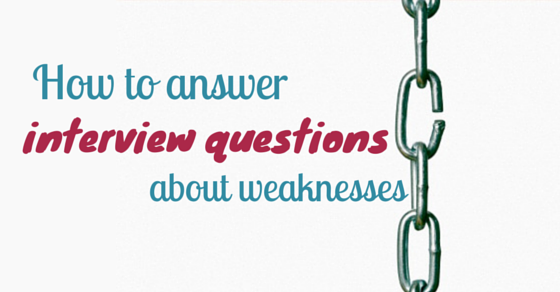We all have some sort of weakness that we tend to hide from the public eye, but what if you are asked to share the same with your interviewer?
Will you pour your heart out about the weaknesses you have or will you hide it from your interviewer as well?
If you choose to do any one of these, then both your actions will be wrong, instead you will have to find a middle way where your weakness will work as your tool to display some of your qualities as well. Sounds confusing?
No, it is not. When the interviewers ask about your weakness, then the first thought that crosses your mind is to deny the fact that you have any weakness at all.
But, you don’t do that, instead you try something even worse, like saying ‘I tend to overwork at times’. You might feel that it will show your positive side that you are interested in taking the initiative and hard working nature, but in reality things will be completely different.
The interviewer will understand that you haven’t come prepared for this question and you are making it up on the spot.
Do you think, this is what you want your interviewer to assume about your personality? Definitely not, so what you need to do is prepare well for this question and what to answer when asked what are your personal weaknesses in an interview?

This question is a delight for an interviewer because he gets to know a lot about your personality by the way you answer this question.
The very moment he asks you this question, without your knowledge, your expression will change and the interviewer will know it all.
There are several ways of answering this simple question on weakness; but you have to understand which one will be best suited for you.
The mistakes that the candidates generally commit:
Some candidates feel that it is an intrusion on their privacy, so they don’t need to speak about it. They blatantly say that there is no such weakness in them which will hamper his work.
There are some others who feel that saying the truth will earn them some brownie points and provide an edge over the others, so they tell the truth.
If you are saying that you have hard times waking up in the morning, so most of the time you are late in the office, then it would only raise a red flag in the interviewer’s mind.
You can turn your negatives into positives, but then again, the interviewer will understand that you are lying straight away.
So, when you are asked to share your weaknesses you have to come up with something that will be genuine, but will not hamper your reputation as well. Read on, to know more about these tricks and tips to tackle these questions.
1. Minor weaknesses:
If you say that you get scared when you have to speak in front of a large audience, then it is a weakness, but nothing major which will impact your job at the moment.
Moreover, add to it that you are working towards getting over this initial jittery, to show that you are aware of your weakness and you are also trying to overcome it.
It is obviously a positive thing in your personality. So, in this way you can turn your weakness into your strength.
2. Explain the situation:
 You can come up with a one liner, but that would not explain anything to the interviewer, therefore, rather than saying something like ‘I am dominating’ you can say that when time is pressing and you see that loads of work is there to be completed, you tend to pressurize the team member to work harder just like you to get it done on time.
You can come up with a one liner, but that would not explain anything to the interviewer, therefore, rather than saying something like ‘I am dominating’ you can say that when time is pressing and you see that loads of work is there to be completed, you tend to pressurize the team member to work harder just like you to get it done on time.
This will show that you have the quality to motivate others when required and it is definitely a positive sign.
3. Know your role first:
While preparing for this answer you must keep in mind what position you have applied for and whether the reply that you will give will affect your chances of getting selected or not.
If you are being interviewed for a role in corporate communications, then do you think that you will get selected if you say that you have a problem with public speaking?
No, so it is important that you know what all you have to do before you prepare your answer.
The job description will tell you everything that you need to know, so just steer clear of all the things that might hamper your chances.
4. Know where you really lack:
Most of us don’t even bother to give it a thought, but all of us do have some kinds of weaknesses that might come across a big hurdle at some point or the other.
It might seem silly initially, but with each passing day you will realize how it is affecting you.
So, you might be very poor with spellings, but you don’t want to say that because you don’t know how the interviewer will react to it.
You can avoid letting him know about this, but he will come to know about it sooner or later and at that point of time you will have to face the music.
Therefore, it is better to come up with an honest answer, but remember you must also provide a solution too.
Like you can say that, you are very bad with spellings, but for the last few years you are really studying hard to get over this and it has improved your spellings a lot.
Be prepared for a small impromptu test when you say so, but hey you want the job, right? So, you will have to prepare yourself for this much.
5. You really have to understand what your interviewer wants to listen:
 So, it is almost the end of an interview and when you thought that this interview was a smooth sailer, you are asked about your weakness. How do you answer?
So, it is almost the end of an interview and when you thought that this interview was a smooth sailer, you are asked about your weakness. How do you answer?
You have to first understand what the interviewer wants to know after you have given almost every detail about you!
The interviewer is not in the mood to get into your past and dig out the deep dark secret of your life here. They are simply not interested, they ask this question just to assess whether hiring you will be a risky affair or not! .
The company will be investing a lot on you, from the time you get hired, so the onus is for the interviewer to make sure that they have the best candidate for the position who will be a good return on investment.
So, provide them with the reassurance that they are making the right selection and there is no major fault in you that cannot be repaired.
6. Providing options:
When you are trying to come up with your weakness you can place your strength ahead of it, so that you can allow your weakness hide behind it.
So, you can say that if you are given a choice, then you would love to opt for strategic planning rather than implementation of that plan.
In this way you are saying that you are strong at planning and somewhat detests the idea of implementing the activity.
Your interviewer will get the message and you have also answered the question by framing it in terms of preference between two opposite poles.
7. Weakness is not always bad:
You have to answer this question in a way which will show that you know your weakness well and not just that you also know how to overcome it as well.
Therefore, if you are saying that you are not that good with presentation, then you can also let your interviewer know that you need some extra time to prepare for the presentation because you are not a spontaneous speaker.
It just means that if you are given some extra time, then you will be able to perform well.
8. Let them know how you got rid of your weakness in the past:
 If you are not sure about whether you will be able to communicate your current weakness confidently, then you can mention that in the past you have taken steps to overcome your weakness, like you might have joined some course or took the guidance of your ex-boss or maybe colleagues.
If you are not sure about whether you will be able to communicate your current weakness confidently, then you can mention that in the past you have taken steps to overcome your weakness, like you might have joined some course or took the guidance of your ex-boss or maybe colleagues.
This will put forward your ability to self assess and how well you understand what your weaknesses are.
9. Describing weakness in a neutral manner and in concise format:
When you are talking about your weakness you can explain it concisely without getting into so much of intricate details about why it happened and how.
Keep your answer to the point, without going overly negative or too much defensive.
10. Come up with the obvious yourself:
If you have some issue which you know will come up during the interview, but the interviewer is not comfortable talking about it, then you can bring it up on your own.
Like the evident wheelchair, you can let them know that it is not a hindrance for you at all, instead validate the aggressor and walk your way through this situation.
Some weaknesses you can mention:
There are some weaknesses that you can mention without getting into the bad books of the interviewer. Here we will be discussing some of them to help you in preparing for this dreadful question.
- You can say that delegation is something you are not comfortable with because you keep on thinking that if you want to do it correctly, then you must do it on your own and that is the reason, you are stuck with all the work. Saying so, you must also let your interviewer know that you already have taken steps to deal with the situation. You have joined management training course where they teach you with all the management skills, including how to delegate work successfully. After completing the course, your management skills definitely enhanced and you were able to handle a team all by yourself . Here, you have to emphasize more on how you overcame the weakness that you had rather than saying how your weakness was affecting your career.
- Public Speaking seems to be the safest answer when asked about weaknesses, but remember that must not be the case always. But, in case you are talking about public speaking as your weakness, then you will have to frame it properly. Let your interviewer know that when it is a small group of people in the room, then you are the one who speaks up first, but in case it is a big group, then you take your time to come up with your presentation. You understood that this is posing as a hindrance in your career and that is the reason with the help of your manager, you took presentation skills program which was held internally and by the end of it you were able to stand in front of a town hall filled with people and provide a 15 minute presentation without fumbling and with full attention from the audience.
- While providing feedback, you tend to be honest which sometimes poses to be a problem. Here you will have to dig in a bit and say that your nature is like that and though your colleagues over the time have understood that, but you have realized that there are times when diplomacy is the best thing to opt for. It was during the conflict management classes that you realized how your directness must have affected the person on the other side. It was during this very training you realized the importance of communicating your thoughts in a different way for different people. So, here you are explaining one of your personality trait as your weakness and how you managed to overcome it as well.
All these options are good way of handling the question that deals with your weaknesses, but remember, you have to frame your answer properly and it must not sound like you are making up something. You will have to talk about some genuine weakness, so if you do not have any problem in public speaking, then do not say so just to avoid the question. There is nothing like the best answer in this case, because the weakness will differ from person to person.







































